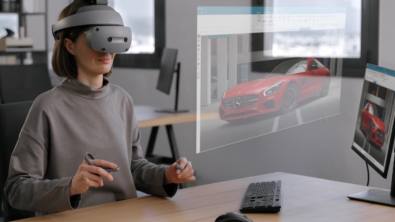Industry perspectives on AI with Dale Tutt – Part 1

In a recent podcast, Dr. Justin Hodges, an AI/ML Technical Specialist and product manager for Simcenter, interviewed Dale Tutt, Vice President of Industry Strategy at Siemens Digital Industry Software to discuss the impact AI will have in industry going forward. Dale has more than 30 years’ experience designing and building aircraft and spaceships for the aerospace and defense industry before joining Siemens. Over the course of the episode, Dale and Justin explore some of the challenges, both new and historic, faced by designers and engineers, the ways AI will help alleviate them, as well as some new opportunities enabled exclusively through the use of AI. Check out the full episode here, or keep reading for a brief summary of the highlights.
AI maximizes effort
Dale starts off by highlighting a major challenge the industry is facing in the shortage of qualified engineers even as the need to develop new sustainable products continues to rise. While AI can’t do anything to address the root causes of the shortage, it can help to maximize the efforts of the engineers the industry does have. Justin continues on to highlight the automation potential of AI and Generative AI, taking the boring or mundane tasks that can occupy a great deal of time and moving them off to an AI partner to handle.
Based on his personal experience, Dale found that, even as recently as within the last 5-10 years, engineers could be spending 60 to 70% of their time writing documentation, creating drawings, performing data conversion and other similarly mundane tasks. But now, thanks to AI, these processes that just consume people’s time can start to be automated, allowing them to focus on actually solving complex problems instead of managing data. Not only will this boost productivity, but increase job satisfaction as well since these professionals will be able to spend 100% of their time solving problems, instead of the 30% they do today.
Generative AI changes the design process
The design and manufacturing industry is in the midst of a digital transformation and there’s already seen great success in connecting system and building interoperability between different applications – a seamless transition between engineering and manufacturing. But the next big thing on the horizon, says Dale, will be how artificial intelligence and machine learning will be implemented into solutions because that is now what’s going to truly help companies move from just connecting solutions to really automating them and moving into a true generative design process.
While interest in AI has come and gone in the past, Justin believes it’s now here to stay and with it some of the exciting tools such as generative AI offer the potential to shake up the way products are designed and optimized. Dale goes on to give a great example from the automotive industry where, using AI technology and generative engineering processes, manufacturers were able to eliminate several miles of excess wiring from a car design saving 50 to 60 pounds of weight. Similar procedures are now applied to aircraft as well, where every pound is crucial.
Looking farther ahead, AI has the potential to optimize not just single elements but designs and systems as a whole, allowing engineers to quickly find optimal designs in a fraction the time it currently takes. As the capabilities of AI systems continue to develop, it may be possible in the future for complete designs to be generated from given requirements allowing designers to explore a vast design space quickly and efficiently, potentially leading to the development of novel new concepts.
Advancing digital transformation
Even as new companies are embarking on their digital transformation journey, those that have already begun the process are looking to take the next step of bringing artificial intelligence and machine learning into every level of design and manufacturing. The insight of industry experts such as Dale Tutt will be vital in understanding the areas where AI will have the greatest impact, both the low hanging fruit that will offer immediate boosts to productivity and the long-term goals that will enable new paradigms across the industry.
Anyone who’s interested should check out the podcast here, or read the transcript here to learn more.
Siemens Digital Industries Software helps organizations of all sizes digitally transform using software, hardware and services from the Siemens Xcelerator business platform. Siemens’ software and the comprehensive digital twin enable companies to optimize their design, engineering and manufacturing processes to turn today’s ideas into the sustainable products of the future. From chips to entire systems, from product to process, across all industries. Siemens Digital Industries Software – Accelerating transformation.


